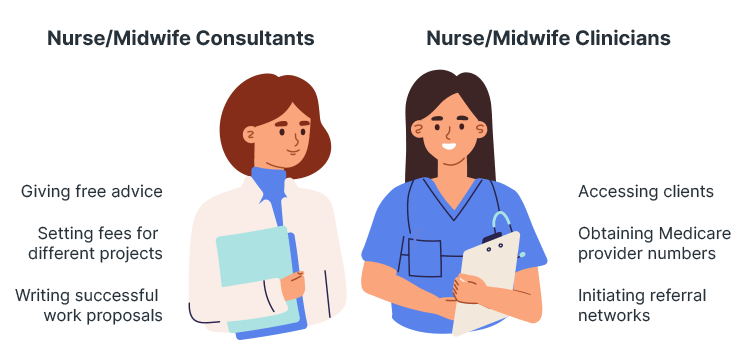Written by Bernadette Keane, RN, FRCNA (Retired)
Table of Contents
- Introduction
- Business Failure
- Preparing For Private Practice
- Networking For Success
- Self-understanding Analysis
- Listing Possibilities
- Part-time/Full-time Private Practice
- Business Premises
- Talking to Relevant Experts
- Preparing a Business Plan
- Marketing Research
- Business Structure
- Australian Business Number (ABN)
- Finances
- Fee Structure
- Small Business Course Enrolment
- Business Title Registration
- Suggested Business Equipment
- Insurance Coverage
- Legal Aspects
- Competition
- Success Essentials.
Introduction
Traditionally, someone else has employed nurses and midwives.
Therefore, the change to delivering nursing/midwifery care unencumbered by traditional bureaucracy must be balanced against the difficulties inherent in establishing an independent practice.
Success in your own business depends on the possession of specific resources, such as organisational skills, adequate finances, physical stamina, emotional resilience, and the desire to be your own boss.
These skills will be critical as the nurse/midwife clinician or nurse/midwife consultant develops a business plan and makes crucial decisions, such as how to gain access to clients.
National registration of Australian nurses (and nine other categories of health practitioners) commenced on 1 July 2010. As a result, the title ‘Nurse Practitioner’ now applies only to those registered nurses who have completed an accredited course, at a Master’s level.
And so, in these guidelines, I use the term ‘Nurse Clinician’ when referring to those in private practice who provide fee-for-service patient care and advice. Those nurses who are self-employed but not involved in direct patient care or counselling are referred to as ‘Nurse Consultants’.
Independent practice is a liberating choice; it liberates you to have self-actualised freedom - but the dark side is that it can liberate you into bankruptcy.
What follows are step-by-step guidelines to assist those nurses who are taking lateral leaps into private practice.
Business Failure
I launched my own private practice in 1986 and offered my last service in 2012.
During the 1990s, I had a five-year stint as President of Nurses in Independent Practice, a Victorian association. Over the years, I’ve had the privilege of speaking with many nurses/midwives newly embarked in their private practices.
Here is a summary of the main initial problems they encountered:

Shared difficulties between these two groups were the challenges of marketing their services consistently and successfully, delayed payments and the peaks and troughs in work availability and cash flow.
Four major reasons why business enterprises fail are:
- Overcommitting time by taking on too many clients too quickly
- Not acknowledging limitations – for example, accepting work that is beyond your talents and experience
- Not allocating sufficient money and time to marketing
- Poorly presented brochures or service proposals.
Preparing for Private Practice
When outlining the recommended steps for launching yourself into private practice, the strategies I will address are:
- Networking for success
- Your self-understanding analysis
- Listing possibilities
- Part-time or full-time considerations
- Your business structure
- Marketing research
- Talking to relevant experts
- Your business premises
- The business plan
- Business courses
- Fee structure
- Business title registration
- Post office box lease
- Office equipment
- Advertising
- A few words about insurance coverage.
Networking for Success
Acting as an information resource and support for nurse/midwife colleagues, in return for their interest and support, is an intrinsic part of advanced professional development.
Goal-directed networking yields reciprocal benefits for the parties involved. This is particularly so when you are on the verge of propelling yourself into private practice, where word-of-mouth referrals can be of considerable importance.
On the other hand, over-reliance on word-of-mouth connections is inadvisable.
Self-Understanding Analysis
You need to become totally immersed in the building of the business and develop innovative ideas that complement your expertise.
Searching personal questions have to be honestly answered with regard to your:
- Existing skills, which can be converted into marketable services or products
- Levels of assertiveness and experience in taking risks
- Enjoyment of working alone
- Degree of self-motivation
- History of coping with adversity
- Potential ability to present credentials and to sell services to clients
- A desire for success in independent practice
- Knowledge of what is needed to run a successful business.
Characteristics of successful business people have been comprehensively studied.
Findings include high levels of energy so that one can work for long hours, combined with a belief in one’s ability to achieve goals. It is also crucial to foster a commitment to long-term planning.
Owners of successful businesses often favour moderate risk-taking, and when setbacks occur, they are disappointed but not discouraged. You need to become totally immersed in the building of the business and develop innovative ideas that complement your expertise.
Quickly establishing a track record for dependability, reliability and integrity is invaluable.
Philip Darbyshire
I waited until the world’s global financial crisis to give up my secure professor job and form my own consulting and speaking business. My only regret is that I didn’t do it sooner. I had no business background, having always worked in the public sector, but looking back, I can see that my intrapreneurial tendencies were always there. Sometimes, these were encouraged, but latterly, the micromanagers would try to stymie them. I knew that I could do better and have a wider and more positive impact by consulting nationally and internationally.
Starting your own business is scary and exciting in equal parts and the learning curve is steep. The buck stops relentlessly with YOU. If you have no value to offer clients or do not do good work, you will have no income and no business. Simple as that.
The benefits are that I work with some of the world’s best health services, NGOs and universities - organisations that really want to make things happen - and know that external expertise and a ‘fresh eyes’ perspective is essential. I help them evaluate and see how they are doing more clearly, boost their research culture, improve their health or professional education services, or ensure the success of their conference. I get up every morning thinking what a great job I have. How good is that?
Philip Darbyshire began Philip Darbyshire Consulting Ltd in Adelaide in 2008. He undertakes a range of external reviews and evaluations within the health, higher education and NGO sectors and has helped organisations in Australia, NZ, Italy, Sweden and the UK to improve their services. He is also a sought-after Keynote Speaker and Masterclass Presenter. He also has professorial appointments with Monash and Flinders Universities.
Listing Possibilities
While in the preliminary stage of considering your career change to independent practice, a worthwhile exercise is the listing of your knowledge base, skills, professional experiences and areas of special expertise.
This is the foundation for decisions about which services/products you will promote. Examples of products generated by independent nurses/midwives are audio-visual materials based on their areas of expertise, education manuals and other relevant publications.
Part-time/Full-time Private Practice
Will your private practice work be part-time or full-time?
In the initial rush of enthusiasm, caution is advisable. At the outset, many nurses/midwives retain part-time employment concurrent with part-time private practice activities. Mixing employee status and independent work status raises the challenge of making yourself easily accessible to your clients without conflicting with your wage-earning job.
There is also the issue of maintaining boundaries so that the sources of your private practice clients are totally separate from the clients you encounter where you are still employed.
Later on, the decision is whether to continue this combination, or whether a full-time private practice arrangement is possible.
Obviously, it is unwise to change to a full-time operation until you are sure you can generate sufficient income from your private practice alone.
Business Premises
The factors influencing your decision on where to locate your business will differ depending on whether you live in a city, regional centre or remote area.
Clearly, if you are not going to work from home, there is considerable expense involved in renting or buying a business venue. Another option is leasing an office in a serviced office suite.
The location of your office calls for an exploration of options.
Question: is it best to have the office at home, in a professional suite or next to a supermarket?
Some recommendations for those who work from home are:
- Take into account the impact on your family
- Isolate your office from the rest of the house
- Never allow children to answer the phone. In fact, the ideal is for your business to operate on a separate phone line or mobile phone.
Working from home has many advantages such as convenience and lower operating costs. Alternatively, you may sub-lease sufficient office space for your needs from another health professional.
For example, rooms that are not being used in the evenings present an opportunity for you to negotiate to see clients for evening appointments. The ideal professional suite is one that is well-maintained and easily accessible, with ample parking nearby.
Talking to Relevant Experts
Speaking with relevant experts is an indispensable part of the preparation sequence. Consider talking to:
- Representatives from small business organisations
- Marketing consultants
- National nursing, midwifery and/or union organisations
- Your bank manager, solicitor, insurance broker and accountant.
Particularly useful is finding time to speak with nurse/midwife clinicians or nurse/midwife consultants who are already working in private practice, especially those whose work is similar to the services and products you propose to launch.
Preparing a Business Plan
Starting any business venture without a business plan is inviting disaster.
If, for instance, you require financial assistance from a lending institution, an application for finance will not even be considered if you don’t have a formal business plan. It also assists with monitoring your progress or lack of progress.
As the saying goes, ‘don’t plan to fail by failing to plan’.
The actual writing of the business plan is very important because it forces you to focus on your goals, objectives and means of achieving them.
Like any good plan or budget, your business plan will be a guide. It is important that it be flexible to allow you to take advantage of unforeseen opportunities.
There are a variety of books available that provide guidance for writing a business plan.
At a minimum, the plan should include:
- The purpose of your business
- Your specific goals and objectives
- A definition of your services/products
- A financial forecast of proposed expenditures
- Income for the first six months (in detail) and for the first two years (in less detail)
- Initial funding resources.
A crucial part of any business plan is the marketing component.
Crossing over from employee status - where direct marketing is the responsibility of others in the organisation - to an entrepreneurial status, where the individual must do the marketing, is challenging.
A carefully prepared business plan provides the answers to the following six questions:
- What business am I in?
- Where am I now?
- Where do I want to be in 3 months? 12 months? 2 years?
- How do I get there?
- Who are my competitors?
- How do I know if I’m on track towards achieving my goals?
Some excuses for not preparing a business plan include: ‘I know what I’m doing without it’, ‘It’s too complicated’ and ‘I don’t have enough time.’
The five basic resources that need to be evaluated in every business are:

Marketing Research
A marketing plan is essential.
Ideally, the target population of those who are likely to use your nurse/midwife clinical or consultancy services should be surveyed before you launch your private practice.
The cost of this strategy is repaid by having a researched database instead of just intuition as the foundation for estimating which services are marketable. Expert assistance may be needed for the design of a business feasibility study.
Questions for consideration include:
- How will you tell your target market about your business?
- Why do you think people will buy what you are selling?
- Who and what are your competitors, and how will you differentiate yourself from them?
- What are the features of your services/products, and what benefits will they provide?
- What will you charge for each service/product?
Business Structure
The four main types of business structures are:
- Sole proprietor
- Partnership
- Company
- Trust.
There are advantages and disadvantages for each of these alternatives, which will be revealed in discussions with your accountant. At the same time, you can clarify which tax laws will apply.
Australian Business Number (ABN)
You can register your business name with the Consumer Affairs Department or the equivalent government department in your home state.
It is possible to register with the Australian Tax Office online for your Australian Business Number (ABN).
Heather Harris
I am a storyteller. I am a midwife and IBCLC lactation consultant. I spent the first 30 years of my professional life working in the Australian hospital maternity health system before using my midwifery skills in resource-poor settings abroad with Medecins Sans Frontieres. This was a transformative experience, and I returned home after each mission with a renewed sense of gratitude for the incredibly fortunate life I have been gifted.
My profession is my vocation, so as that wise man once said, 'Do what you love, and you’ll never work a day in your life.' The rich experiences I have had, both in my professional and private life, provide me with the opportunity to apply this knowledge in a practical way.
My private practice entails consulting with mothers about infant feeding. I have a passionate interest in resolving problematic breastfeeding issues. Boroondara Breastfeeding Centre came into being a couple of years ago as a consulting practice and professional educational venue. I now make home visits to women experiencing breastfeeding problems. I love it. It gives me the autonomy to work at my highest potential and free of institutional constraints. This, combined with presenting educational sessions at various venues, keeps me busy. I believe it is imperative that we share our knowledge as this is one of the ways we can improve community health.'
Heather Harris (BN (Deakin) MMid (LaTrobe) IBCLC) is a highly experienced midwife with a Master of Midwifery and Lactation Consultant (IBCLC. Accredited) qualifications. Heather has successfully run a lactation service as part of her private practice. In her Master's studies, Heather evaluated the validity and reliability of a midwife-administered breast-feeding assessment tool. Her varied background as a midwife, clinical teacher, lactation advisor and project manager includes successful Baby Friendly accreditations for Mitcham Private Hospital and Royal Women’s Hospital, Melb. Heather’s impressive midwifery achievements include working for Medecins Sans Frontieres in a number of developing countries.
Finances
Monthly records of income and expenditure are fundamental to good financial management.
If you register your business for GST, then this complexity needs to be managed. If, from the outset, you are in full-time private practice, then provision must be made to cover your operating costs, living expenses and other personal financial commitments for at least six months.
In some instances, depending on the type and scope of your business, you may need to have one or two years of cash reserves if your business plan shows a long lead-time before profits will ensure a surplus cash flow.
There is a risk that newcomers to the world of private practice can become lulled into a false sense of security with one or two initial projects, only to find when this work is finished, they have insufficient resources to carry them until further projects are obtained.
As already mentioned, it is wise to make provision for a marketing budget within your business plan.
Fee Structure
One of the questions uppermost in the minds of newcomers to private practice is how much to charge for the services/products on offer.
One guideline is to charge what the market will bear while at the same time taking into account your estimated expenses, profit margin and available working days per year.
Your fees need to be both profitable and competitive. As required, you can be flexible with your fees, for example, by providing some clients with discount rates, so long as you calculate the impact of this flexibility on your cash flow status. Right from the start, set a ‘mates rate’ or a discount for family and friends. Otherwise, there is a risk of being trapped into a pattern of sequential ‘freebies’!
Nurse/midwife clinicians are faced with the dilemma of having clients who expect fee rebates for health services and for whom rebates are often not available from the health insurance funds.
An annual review of fees is necessary so that your fee scale is competitive, keeping pace with inflation and covering the inevitable increases in operating costs.
Small Business Course Enrolment
Before or shortly after launching your private practice, enrolment in a reputable business course can be a most useful source of advice regarding financial, regulatory, promotional and business structure considerations.
Some very good courses are offered in the vocational training sector or by commercial business associations.
Business Title Registration
All legitimate businesses are required to be registered with the relevant state authority.
Upon application, a database search is made to ensure that your proposed business title is unique and then, in exchange for a moderate fee, the business is registered for three years.
Suggested Business Equipment

These suggestions are in addition to specific nursing/midwifery equipment, such as fetal stethoscopes and glucometers.
Filing Cabinets
One or more filing cabinets are useful as a backup in case you encounter problems with your stored electronic data. Second-hand cabinets, which can be locked, are adequate for these purposes.
Computers and Printers
Computers and printers are invaluable for word processing, updating and tracking high volume data, cash flow spreadsheets, generating mail-merge information to potential/existing clients, graphics, email/Internet and other aspects of information technology. Promoting nursing/midwifery services on the internet through your own website is valuable. It is recommended that you access advice from an expert web designer.
Telephones
To facilitate access for potential or existing clients, it is recommended to have a mobile telephone service choice for business calls.
Stationery
Business cards should be the standard size, approximately 90 mm in length and 55 mm in height. Correspondence should not rely entirely on email transmissions. There are occasions when a formal letter needs to be written and sent via the postal service. It is recommended that your letter-headed writing paper, envelopes, brochures, income tax invoice sheets and compliment slips be professionally designed so as to convey positive impressions about the quality of your service.
A final tip regarding office equipment is to purchase a stamp with your business name and ABN on it - for stamping important documents such as receipts.
Insurance Coverage
It is advisable to take out various types of insurance if you are not already adequately covered for your new role.
One example is private superannuation; another is income protection insurance in case you are unwell, not able to work for some time or need income continuity.
Since July 2010, when national registration of health professionals was initiated, professional indemnity against the prospect of being sued by clients is mandatory.
Make sure your PI insurance adequately covers the private work you do - be sure to read the fine print, and remember, cheap insurance may not be cheap in the long run!
Whatever the avenue chosen, private practice undoubtedly puts nurses/midwives at risk and makes them individually accountable for their practices as contrasted with employees who are usually covered by the vicarious liability of their employer.
Remember that your legal duties don’t change, but your exposure to litigation does change. Discuss your full range of insurance requirements with a reputable insurance broker and shop around, as quotes can vary by surprisingly large amounts.
Some helpful brief definitions:
- Professional indemnity insurance covers damages arising from advice that incurs a financial loss for the client. (If you are a member of a union that offers professional indemnity coverage for members, check to ensure that nurses/midwives in private practice are covered.)
- Malpractice insurance covers damages arising out of bodily and/or mental injury alleged to have been caused by error, omission or negligence in professional services. It also covers specified expenses associated with a claim.
- Public liability insurance covers legal liability when a client sustains an injury to their body or to property outside a professional service.
Legal Aspects
You will continue to have obligations under your state/territory Nurse’s and Midwives’ Act and the Common Law Act. Once your business is launched, your work also comes under the Commonwealth Trade Practices Act and its equivalent state legislation. One section to be aware of concerns the prohibition of unfair, misleading or deceptive information.
If you have employees, then Government workplace laws also apply. Other legal dilemmas/concerns may arise, and timely consultation with a solicitor or accountant is advisable.
Competition
It’s easy to become over-concerned about competition.
Instead of being unnecessarily anxious, awareness about how the competition may impact your practice can be a motivator for innovative work decisions. Aim to get repeat work from clients.
A word of wisdom here: never denigrate your competition to clients. This is unprofessional as well as unethical. If you are directly asked, either give praise or a guarded response.
Success Essentials

Summary of essential elements for business success:
1. Create and build your business on a real market opportunity.
This means finding an opening with as many clients and as few competitors as possible. In a crowded marketplace, ensure that your services/products have enhanced characteristics that improve the value of your service and contrast with those of your competitors.
2. Is the market big enough?
Will it last for a reasonable time? Is there any doubt about the viability of your proposed business? Can those doubts be overcome?
3. Convert some distinctive competence into a sustainable competitive advantage.
This means being different, better or unique in some way.
4. Change must be welcomed, not rejected or ignored.
Forward planning and the search for new opportunities all help to keep your business nimble, competitive and profitable.
5. Continually work to improve your business image and reputation.
6. Strive to be the best rather than the biggest.
Pushing for size and rapid growth may undermine your critical resources.
7. Build on strengths.
Concentrate your effort and resources on doing one or several things well rather than diluting effort and resources by offering too many services. Get rid of unprofitable services.
8. Recognise the difference between efficiency and effectiveness.
Efficiency is doing things right; effectiveness is doing the right things. There is little point in doing the right things the wrong way. Selling the right services to the right clients at the right price is being effective. Producing a profit is evidence of being efficient.
9. Synthesise the various types of risks.
Calculate:
- The risk of being in business
- The risk you can afford to take
- The risk you cannot afford to take
- The risk you cannot afford not to take.
10. Be neither too cautious nor too impetuous.
Doing nothing is often riskier than doing something new and different.
11. Avoid being over-dependent on others.
Being heavily dependent on too few clients for a large proportion of your business can make your business vulnerable.
12. Keep good records.
Whether you are documenting and filing client records or charting monthly cash flow charts, it is necessary to realise that for these to be useful business resources, they must be:
- Appropriate and understandable
- Concise and accurate
- Economically produced
- Up-to-date.
Believe in yourself and your business.
If you are not totally committed to succeeding in what you are doing, you are probably better off out of it. The rewards for those who succeed are great, but the penalties for failing are painful.
Author Details
Following on from a long-time role as a nurse teacher, for over 20 years Bernadette worked as a nurse consultant in her own private practice, ‘Continuing Education Consultation’. A major aim of this service was to assist nurses and midwives through education and career counselling activities.
From December 1992 until January 1998, Bernadette was President of the Victorian association, Nurses in Independent Practice. At that time, a new confederation, Nurses and Midwives in Private Practice Australia (NAMIPPA), was launched as a Society of the Royal College of Nursing Australia (since renamed Australian College of Nursing), and for two years, Bernadette was the newsletter editor for NAMIPPA, which was subsequently renamed 'Nurses in Business'.
Prior to her retirement in 2012, for 18 years Bernadette worked as a nurse consultant for Ausmed.
Ausmed would like to thank Bernadette for her generosity in offering this guide to Ausmed to promote in the wider health community. This guide embodies the many decades of experience and expertise Bernadette developed throughout her remarkable career.
 New
New 
